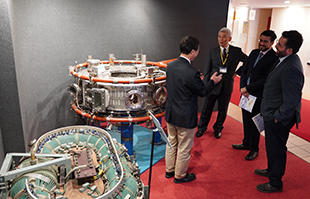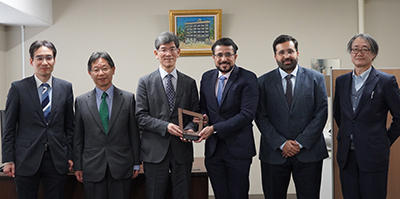Visit of the Executive Director – Bahrain Center for Strategic, International & Energy Studies (Derasat) under the Ministry of Foreign Affairs' Strategic Practitioners Invitation Program
Topics
On Thursday, March 7, 2024, Dr. Hamad Al-Abdullah, Executive Director – Bahrain Center for Strategic, International & Energy Studies (Derasat), and Dr. Abdulla Al-Abbasi, Director of the Energy and Environment Program, who are visiting Japan under the Ministry of Foreign Affairs' Strategic Practitioners Invitation Program, visited our institute.
This program is a system for inviting to Japan those who hold a certain leadership position in various fields or practitioners expected to play active roles in the future. It conducts invitations based on the important diplomatic policies of each fiscal year, aims to build networks with Japanese stakeholders, facilitate the smooth promotion of our country's diplomatic policies, and, in the medium term, aims to increase the base of pro-Japan and Japan-knowledgeable individuals.
The discussion was attended by Director Takashi Morii, Center Director Masato Katahira, Professor Hideaki Ohgaki, and Professor Toshiyuki Nohira, totaling four members. Initially, Director Hamad Al-Abdullah shared information about Bahrain, including the 23 Arabic Summits held to date, the state of international exchanges in environment and economy, and the dispatch of PhD students to countries such as Australia for study abroad programs. He mentioned that there are students interested in studying in Japan, but the challenge of learning Japanese is perceived as significant. At this point, Director Takashi Morii from our institute introduced a Jordanian student currently enrolled at our institute. Professor Hideaki Ohgaki then informed that Kyoto University has accepted many PhD students from overseas and highlighted the availability of government-sponsored scholarship programs through the Japanese Embassy.
Additionally, the Bahraini side inquired whether Kyoto University has a sabbatical system that allows faculty members to go abroad for about a year. Director Morii responded, regrettably, that such a system has not yet been established.
Following this, Director Morii provided an overview of our institute, including an explanation that the Graduate School of Energy Science, Kyoto University, where students are assigned, offers courses where master's and doctoral degrees can be obtained in English.
Subsequently, the group moved to Building North 4, where Professors Kazunobu Nagasaki and Shigeru Inagaki introduced the magnetic confinement plasma experiment device, Heliotron J, and the gyrotron device. They also explained the collaborative research with the International Atomic Energy Agency (IAEA), the University of Wisconsin in the United States, and the Max Planck Institute in Germany, utilizing these devices. From the Bahraini side, there was a request for online lectures on plasma for Bahraini PhD students as an initial step.
During the approximately two-hour visit, significant achievements were made, including discussions that led to the acceptance of exchange students and the planning of online lectures, which will contribute to the development of both countries. This visit resulted in a highly productive exchange.










